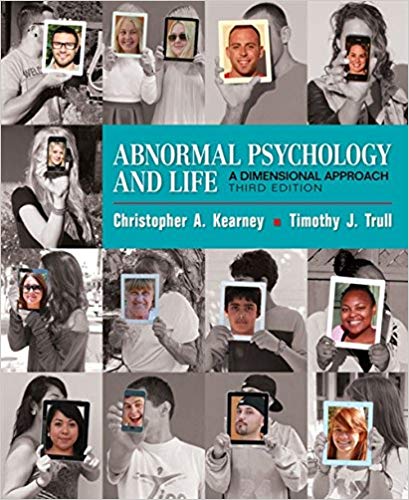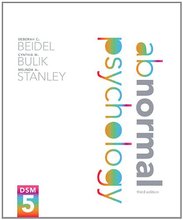Test Bank for Abnormal Psychology and Life A Dimensional Approach 3rd by Kearney
$55.00 Original price was: $55.00.$29.99Current price is: $29.99.
Test Bank for Abnormal Psychology and Life A Dimensional Approach 3rd by Kearney
Test Bank for Abnormal Psychology and Life A Dimensional Approach 3rd by Kearney

Product details:
- ISBN-10 : 1337098108
- ISBN-13 : 978-1337098106
- Author: Christopher A. Kearney
Chris Kearney and Tim Trull’s ABNORMAL PSYCHOLOGY AND LIFE: A DIMENSIONAL APPROACH provides you with a concise, contemporary, science-based view of psychopathology that emphasizes the individual first. Featuring clinical cases and real first-person narratives, the text illuminates our understanding that abnormal behavior can be viewed along a continuum. This widely accepted view places the behavior of an individual at the forefront of clinical definition, assessment, and treatment. The book also gives you an understanding of the features and epidemiologies, risk factors and prevention, assessment and treatment, and long-term prognosis and associated stigma of mental disorders. Special sections are devoted to college students, ideas for those who may have certain symptoms of mental disorders, and other consumer-based material — demonstrating how the subject is personally relevant to you and helping you become an intelligent consumer of mental health information.
Table contents:
1. Abnormal Psychology and Life.
2. Perspectives on Abnormal Psychology.
3. Risk and Prevention of Mental Disorders.
4. Diagnosis, Assessment, and Study of Mental Disorders.
5. Anxiety, Obsessive-Compulsive, and Trauma-Related Disorders.
6. Somatic Symptom and Dissociative Disorders.
7. Depressive and Bipolar Disorders and Suicide.
8. Eating Disorders.
9. Substance-Related Disorders.
10. Personality Disorders.
11. Sexual Dysfunctions, Paraphilic Disorders, and Gender Dysphoria.
12. Schizophrenia and Other Psychotic Disorders.
13. Developmental and Disruptive Behavior Disorders.
14. Neurocognitive Disorders.
15. Consumer Guide to Abnormal Psychology.
People also search:
what are the five perspectives of abnormal psychology
dimensional approach psychology example
what are the theories of abnormal psychology
what is abnormal psychology quizlet
4 definitions of abnormality psychology
You may also like…
Solution Manual
Abnormal Psychology A Scientist Practitioner Approach 4th Edition Beidel Solutions Manual
Test Bank
Test Bank for Medical Dosage Calculations A Dimensional Analysis Approach 10th Edition by Olsen












